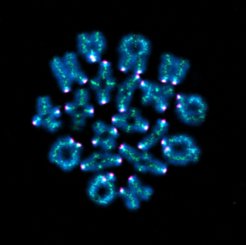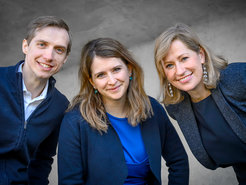Born from research
The start-up Ovo Labs aims to make fertility treatments more effective by improving the quality of human egg cells. To this end, the MPI-NAT spin-off has raised 4 million pounds in seed funding.
According to the most recent estimates, it is roughly one in five couples who are unable to conceive naturally,” says Agata Zielinska. She is a medical doctor and scientist in reproductive medi - cine, alumna of our institute, and co-founder of the new start-up Ovo Labs. In vitro fertilization (IVF) brings hope to many who want to have children, she says. Unfortunately, IVF is not a reliable solution and can be stressful: “In principle, it is effective. But at the same time, at the level of an individual, it actually has a very low success rate. There is only a 25 to 35 percent chance of conceiving through a cycle of IVF.” With Ovo Labs, Zielinska and her co-founders – Melina Schuh, Director and head of the Department of Meiosis at our institute, and Oleksandr Yagensky, biologist and ex-strategy consultant – want to change that. Their new active compounds target the very beginning of human life: the egg cell.
Researching the biological clock

Schuh and Zielinska met over ten years ago when Zielinska started her PhD in Schuh’s lab in Cambridge (UK). When Schuh was appointed Director at the, back then, MPI for Biophysical Chemistry, Zielinska followed her to Göttingen to further conduct their fertility research. “In women, fertility declines because the quality of the eggs declines,” Schuh explains. All the eggs a woman will ever possess are already formed in the female fetus. “By the age of 40, part of the eggs will already be genetically abnormal because they, too, are 40 years old.” Schuh, Zielinska, and many of their colleagues at the Department of Meiosis have worked for years on identifying mechanisms that explain why the quality of the eggs declines with age. The start-up can now rely on two decades of groundbreaking research on this topic. “At Ovo Labs, we are tackling those exact mechanisms we investigated over many years to improve the quality of human eggs,” says Schuh.
Advancing IVF

With their therapies, the Ovo Labs team wants to make IVF treatments more efficient so that more people can conceive with a single IVF attempt. What is more, they want to enable women in their late thirties and early forties to still be able to benefit from IVF: “This is especially important as nowadays people often delay their childbearing plans,” Zielinska says. “It feels very non-equitable that for men, this does not necessarily have such striking consequences. For women, though, entering their forties might mean that they will never become mothers, even if they want to have children.”
Apart from that, Ovo Labs’ three therapeutic approaches – EmbryoProtect 1, 2, and 3 – offer another major advantage for those opting for IVF: “The technology we are developing can be integrated seamlessly as part of a standard IVF cycle,” Schuh says. These active ingredients have the potential to reduce genetic errors in eggs, known as aneuploidies. “We actually treat the single, unfertilized egg cells in vitro, so there are no side effects for the patients.”
Milestones
The start-up recently raised 4 million pounds in its first seed financing round. Alongside venture capital firms from the tech and biomedicine sectors, Antonio Pellicer – founder of the world’s largest chain of IVF clinics – is also investing in Ovo Labs. “With this first round of funding, we aim to further develop our compounds to be ready for clinical trials,” states Yagensky. “The next months at Ovo Labs will be very busy and exciting.” Apart from reaching one of their first milestones – the clinical trial stage – they are working on building a team of scientists and business experts to make Ovo Labs reality.
A Göttingen start-up
Product development will take place at the Life Science Factory in Munich, with the company being officially based in both Munich and London. Still, Ovo Labs feels like a very Göttingen start-up: While Zielinska conducted her PhD research in Melina Schuh’s department, Yagensky wrote his doctoral thesis at the former Department of Neurobiology headed by Reinhard Jahn. “We did not know each other back then, even though we were going down the same corridors and must have attended the same canteen. We never met,” remembers Zielinska. They were first introduced when Schuh and Zielinska were looking for a third partner to help launch their start-up. “It was such a nice and funny coincidence that Oleksandr used to work at the same institute. He has a background in biology, but he actually spent the last five years in consulting and brings business experience to our company.”

A risk worth taking
While Schuh continues to lead her Department of Meiosis and the institute as current Managing Director in Göttingen, both Yagensky and Zielinska are now working full time as co-CEOs for the company. Zielinska even recently moved from London to Munich for her new role. She is confident that the outcome will be worth this risk: “Investors always say that the most important skill of a successful founder is a good dose of optimism and confidence. In our case, we also very strongly believe in our technology. It felt like an incredible risk, but at the same time, also like an incredible opportunity to use the knowledge we acquired to change the lives of women by increasing their chances of a successful pregnancy. We can actually transform the field. That is why we decided to go ahead with it.” (kf)














